EVALUATION
Our office is equipped with an ICAT CT which is a 3D Image of the teeth and bone to insure that the implants are placed in the optimal position based on the quality and quantity of bone.
Choosing a highly skilled Prosthodontist (Cosmetic Specialist) can be the difference between getting the smile you want and a serious disappointment. If you are seeking cosmetic or reconstructive dental work, you should do research before making a decision in order to ensure proper care. As ADA recognized specialists, Prosthodontists are qualified to offer service in state-of-the-art procedures and technique. Some materials and methods are superior to others. A dental reconstruction may seem aesthetically pleasing, but if it is constructed with substandard materials and/or methods the long term prognosis of the restoration will be compromised. Many providers are able to reduce their fees by utilizing methods, materials and components that are quick and reasonable. Dr. Kaplan’s attention to detail and focus on reliability ensures that his work is not only aesthetically pleasing but also long lasting. Using our cutting edge technology can assure that you get the smile you always dreamed of. Your dental reconstruction is an investment ………………..do it right the first time!
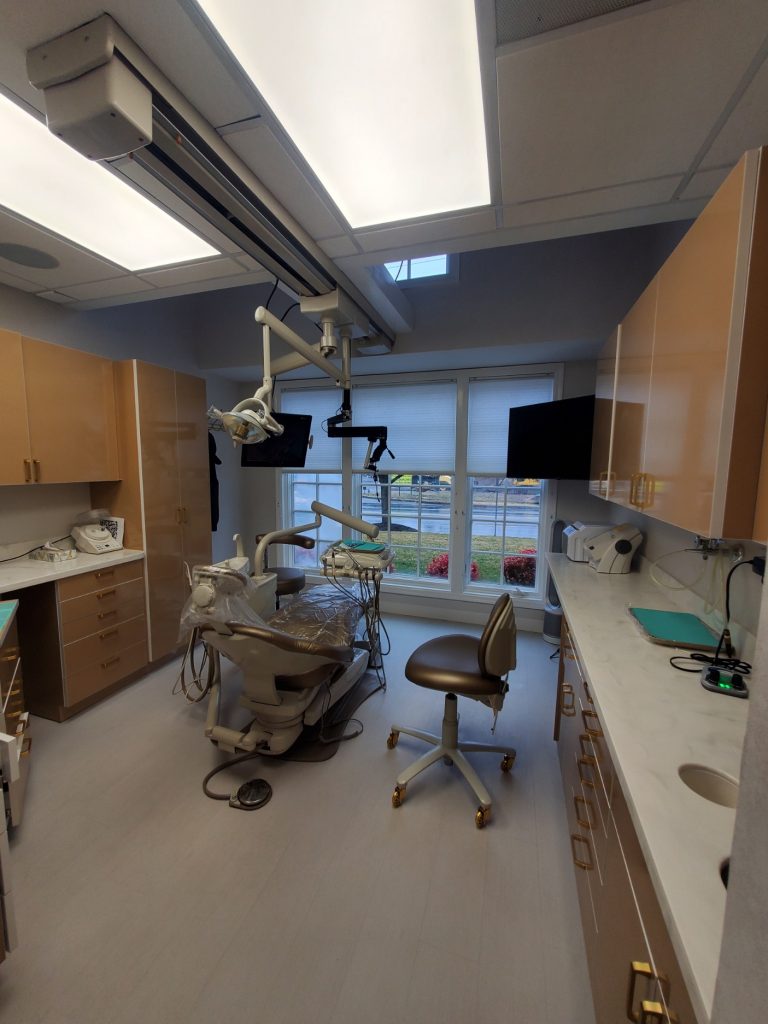
Dr Kaplan’s dual certification in Prosthodontics and Surgical Placement of implants allows him to offer his patients in Morristown, Mendham and Randolph comprehensive treatment plans rather than referring them out for portions of the procedure thus providing the patient with the convenience of one location for care . Our wide range of specialty care includes veneers, crowns, bridges, partials, dentures and dental implants. Most dental implant procedures require multiple visits to multiple specialists adding cost to each stage of the dental implant process. In our office in Morristown, we have one dedicated team that works together, to serve Morristown, Mendham, and Randolph with complete and comprehensive treatment in a cost effective way.
Dr. Kaplan focuses on the color, shape, balance and translucency of all implant crowns. Prosthodontists will have a more in-depth understanding of dental laboratory procedures and how implant crowns can be used to improve esthetics as well as form and function. Anterior (front) implant crowns require special considerations in comparison to posterior (back) implant crowns as there are different forces at play in different areas of the mouth. Esthetics and cosmetics are of the upmost importance in the front of the mouth. Natural front teeth often exhibit many different shades that vary from person to person. At Morristown Prosthodontics and Implant Dentistry, we custom match all of our crowns to the exact shades of each tooth so that they blend in nicely with the surrounding teeth. This allows the crowned teeth to blend in with the rest of your smile.

More than half of todays population is affected by the loss of one or more tooth. Loss of a natural tooth can be traumatic and affect your outlook on life, both personally and professionally. Missing front teeth leave some people embarrassed to smile. Perhaps you have trouble chewing and dentures are a constant worry. Dental Implants solve these problems and restore confidence and comfort. In addition, dental implants can help preserve facial bone structure, preventing the bone deterioration which occurs when teeth are missing.
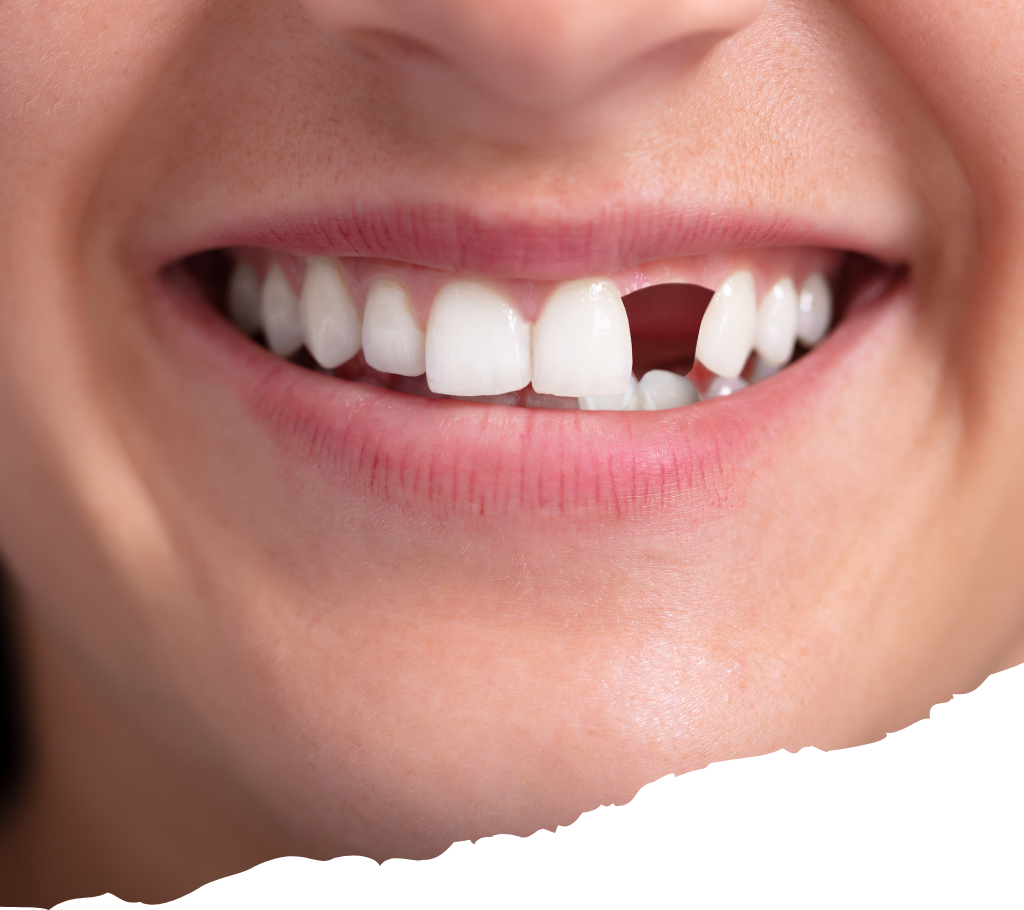
Your missing teeth can be replaced with crowns, bridges and full or partial dentures. Another more permanent solution is dental implants. Implants can also be used together with other dental procedures for greater effectiveness. For example, while a dental implant can be used to replace a single missing tooth, it can also be used to support a dental bridge or a set of upper or lower dentures. Each option has its pros and cons, depending on the health of your teeth and your budget. Dr. Kaplan with over 23 years of experience will evaluate your teeth and gums and help you choose the option that will work best for you.
A dental implant is a permanent artificial tooth root placed into your jaw where there are missing teeth. They look and feel like natural teeth and help prevent bone and gum damage caused by missing teeth.
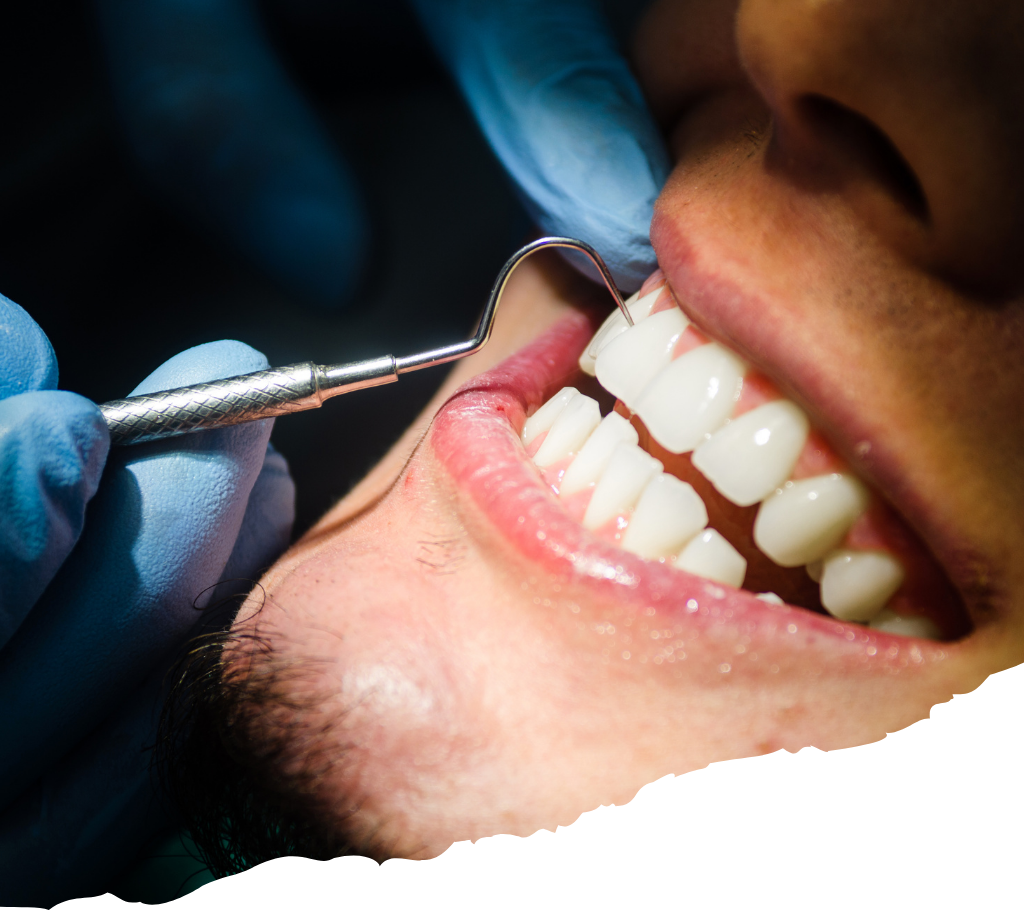
The implant itself is a man made root post (titanium screw) that is placed into the location where the tooth/teeth are missing. Bone will attach to the implanted root and fuse, usually taking a few months. When the tissue and bone have healed, a custom made replacement tooth (crown) will be attached to the implant. Once the crown is in place, you often cannot distinguish it from your natural teeth. Dental implants are the most comfortable, beautiful and cutting edge solution to the problem of missing teeth. They are the next best thing to real teeth. Whether it is a single tooth, several teeth, or all the upper and lower teeth that are missing, implants may be the best option for realizing a comfortably functioning smile again.
Dr. Kaplan is a certified as a prosthodontist and implant surgeon and is qualified to do all the work himself in his state of the art facility, and does not have to refer you to another dentist at any time during the process of implant dentistry.
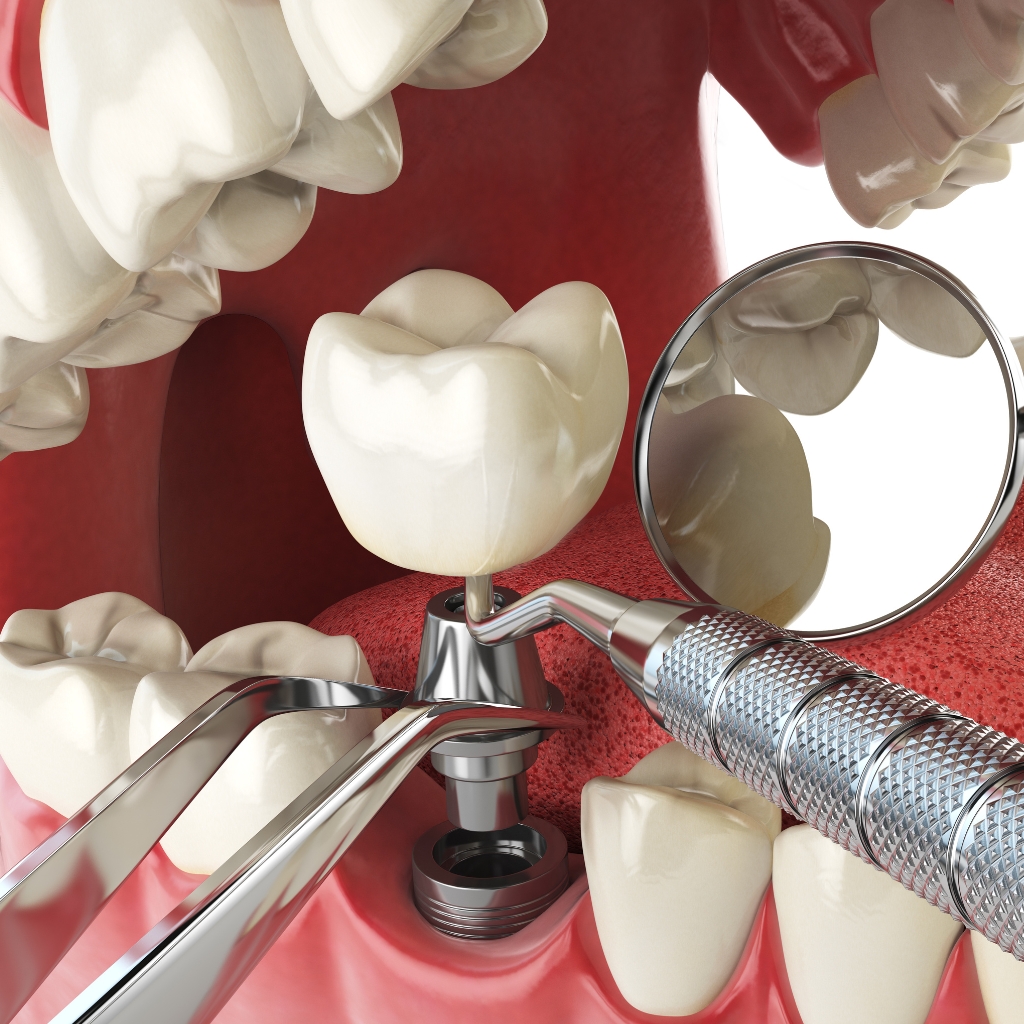
The process of getting implants requires a number of visits over several months.
The entire implant treatment plan will be completed in Dr. Kaplan’s state of the art office. Dr. Kaplan performs the implant surgery and then completes the implant treatment by placing the final restorations. Dr. Kaplan is certified as a Prosthodontist and implant surgeon.

Anyone who is missing one or more teeth. Dental implants are appropriate for patients with sufficient jaw bone material and who are in good to moderate health. They are generally not recommended for smokers. Smoking increases the likelihood of rejection of the implant. Dental implants are not usually used in adolescents until they have reached their full expected height. Every patient is different and patient results may vary. Dr. Kaplan is well qualified to evaluate whether dental implants are a viable solution for you.
Older patients are often concerned that they are to old to undergo implant surgery. However, health is more of a determining factor than age. If you are healthy enough to have a tooth extracted, youre probably healthy enough to receive dental implants. Certain chronic diseases contraindicate dental implant treatment. Some people who have lost bone in their jaw still can have dental implants by having a bone grafting procedure.
Every patient is different and patient results may vary. Dr. Kaplan with his advanced specialty training will determine if youre a candidate for dental implants after careful evaluation of your dental & health history. He will explain the benefits and risks to see if tooth replacement with implants is right for you.
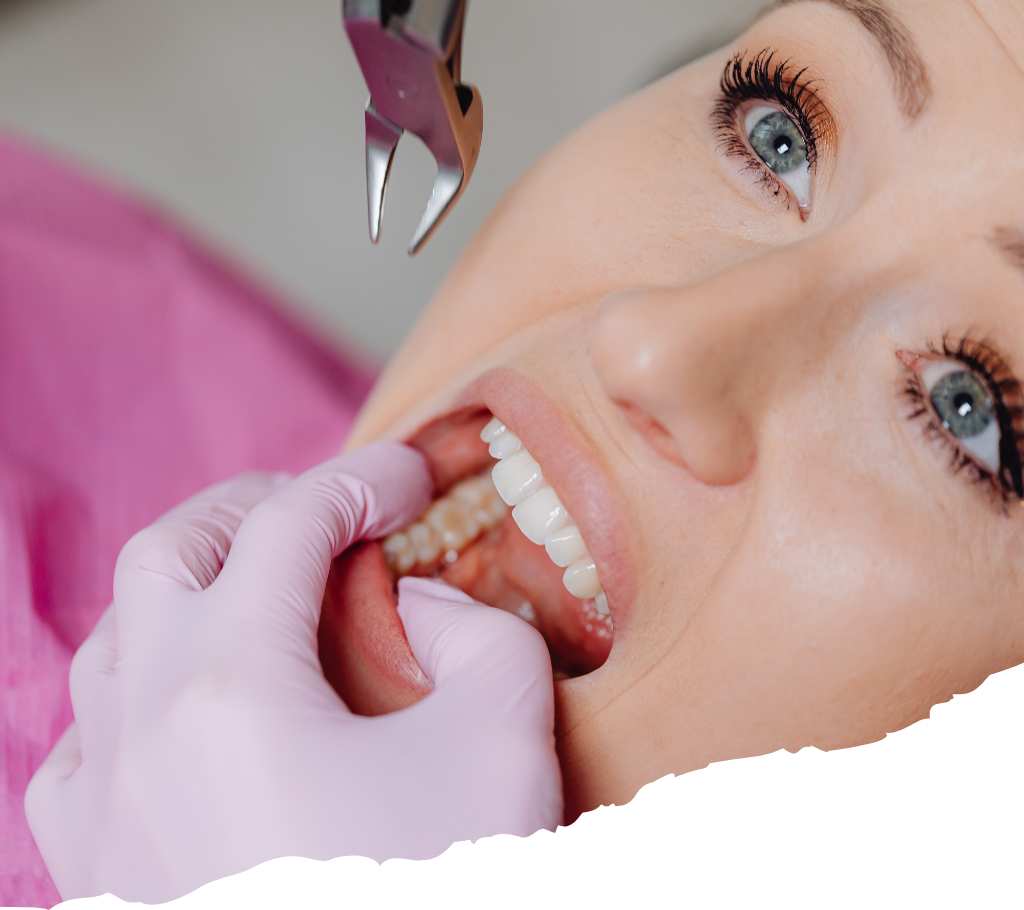
If you are missing a single tooth, one implant and a crown can replace it. A dental implant replaces both the lost natural tooth and its root. When a person is missing one tooth there are two options for replacement; a single tooth dental implant or a three unt. This eliminates the need for a temporary removable prosthesis.. A bridge requires that the teeth on either side of the missing tooth be prepared (cut down). Dental Implants do not require any compromise to the teeth adjacent to the missing teeth or tooth. Because a dental implant will replace the tooth root, the bone is better preserved. With a bridge, some of the bone that previously surrounded the extracted tooth to be replaced begins to deteriorate (resorb). Dental implants integrate with your jawbone, helping to keep the bone healthy and intact. Furthermore, gums can recede (shrink) around a bridge, leaving a visible metal base (collar) exposed. This can lead to an unattractive smile. Additionally the cement holding the bridge in place can wash out, allowing bacteria to decay the teeth that support (anchor) the bridge leaving them at a much greater risk for cavities and endodontic failure.
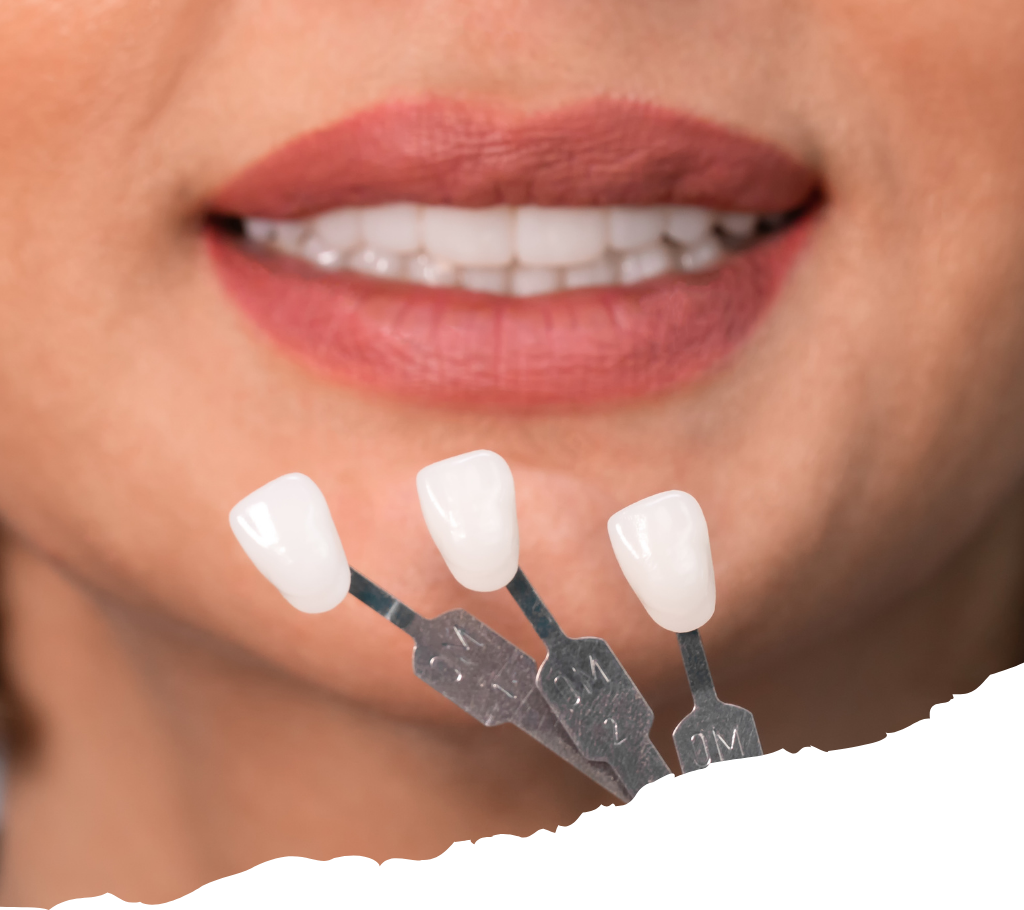
In some cases an implant may be placed immediately after the tooth is extracted. This allows the patient the benefit of less surgery as well as decreased healing time. In esthetic situations, the immediate placement is a great relief to the patie
Losing one or more of your teeth can cause a gap in your smile, the loss of chewing function and the inability to eat a complete diet. While these are certainly serious issues, a potentially bigger problem lies hidden beneath the surface: bone loss. Without the tooth to stimulate the jaw, the bone beneath it will begin to shrink (atrophy) in the same manner that muscle underneath a cast gets smaller. Since your facial bone supports the skin and muscles on top of it, losing volume can cause your face to look prematurely aged. The cheeks become sunken and you get what is referred to as witches chin. The good news is that dental implants offer a solution to stop bone loss. Dental implants transmit chewing forces to the jaw, stimulating it and halting the bone loss associated with missing teeth.
A key to implant success is the quantity and quality of the bone where the implant is to be placed. Before dental implant surgery, bone grafting is sometimes necessary to build up bone in the patients jaw so that implants can anchor firmly. Various techniques used to create sufficient bone have been performed successfully for many years and are fundamental to the implant cases. These techniques include socket preservation, ridge augmentation, and sinus grafts.
A patients need for bone grafting may become apparent at the time of their pre-surgery X-ray. Sometimes, inadequate bone volume is not discovered until the dentist actually begins dental implant surgery. In this case, the dental implant procedure will be halted and bone grafting will take place after the patient has agreed to the procedure.
In addition, special membranes may be utilized that dissolve under the gum and protect the bone graft and encourage bone regeneration. This is called guided bone regeneration or guided tissue regeneration.
The fees for implant treatment varies depending on the complexity of the procedure, the number of teeth being replaced and the number of dental implants required to support your replacement teeth. Some additional procedures may be required prior to the placement of your dental implants to ensure the long-term health of your dental implants. To obtain a specific fee estimate, it is necessary to have Dr. Kaplan examine your mouth. Some dental insurance plans cover a portion of the fee, but most do not. Typically, Dental implants have a higher initial cost than, Crown & Bridge and Full or Partial Dentures. However, dental implants usually have a lower lifetime cost. The long term costs of adhesives and relines associated with dentures can exceed the fee of dental implants. Implants prevent further complications such as tooth drifting and bone loss. Your treatment is a valuable investment to your health and well being. Our office will strive to make your dental restorations affordable by offering a variety of payment options, as well as offering lower cost implants for patients needing multiple implants. This makes good financial sense, considering that implants help maintain bone and protect your youthful appearance.
Experience top-quality dental care in a comfortable and welcoming environment. Whether it’s a routine checkup or a complete smile makeover, we’re here to help you achieve a healthier, more confident smile.